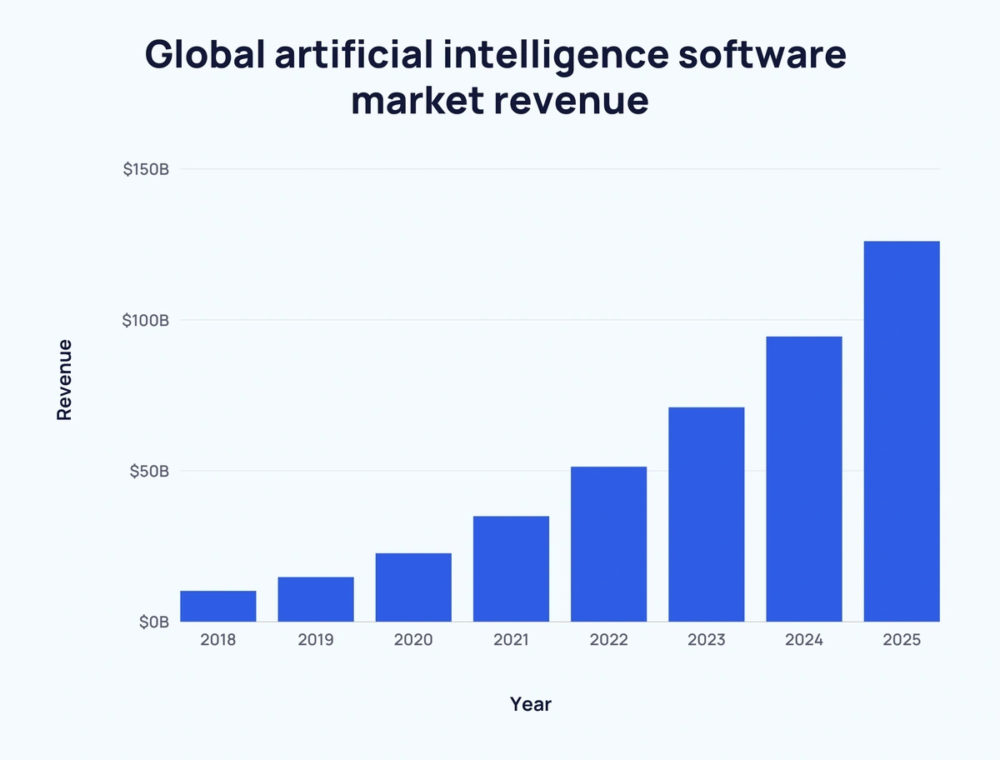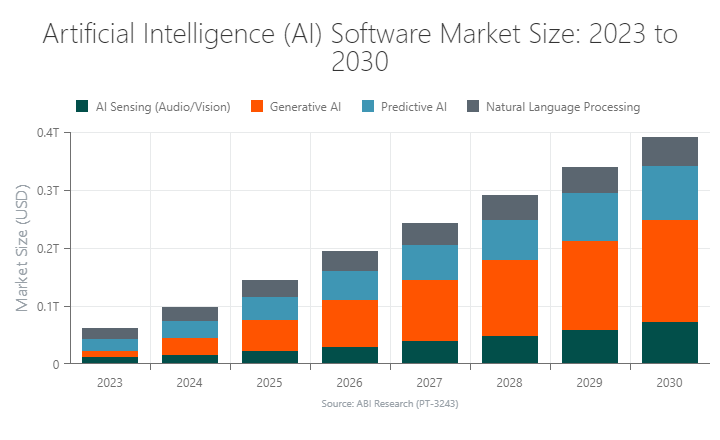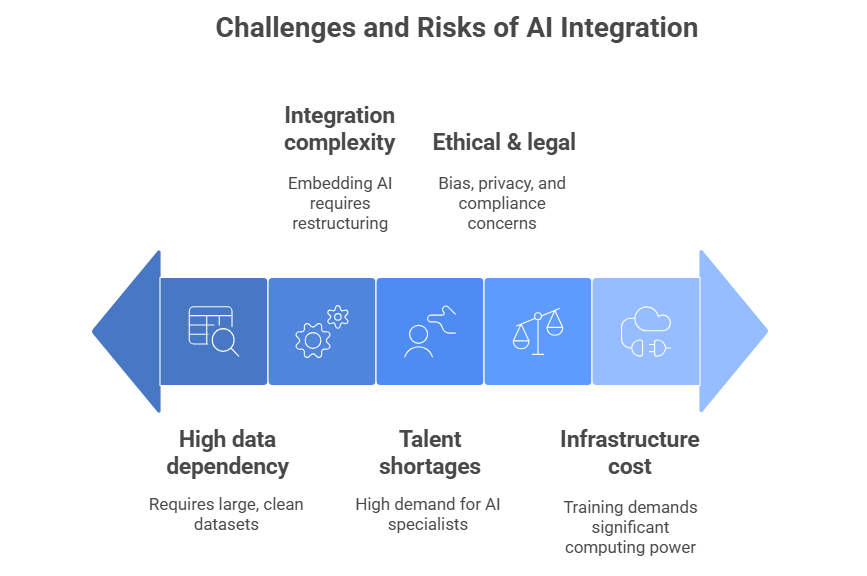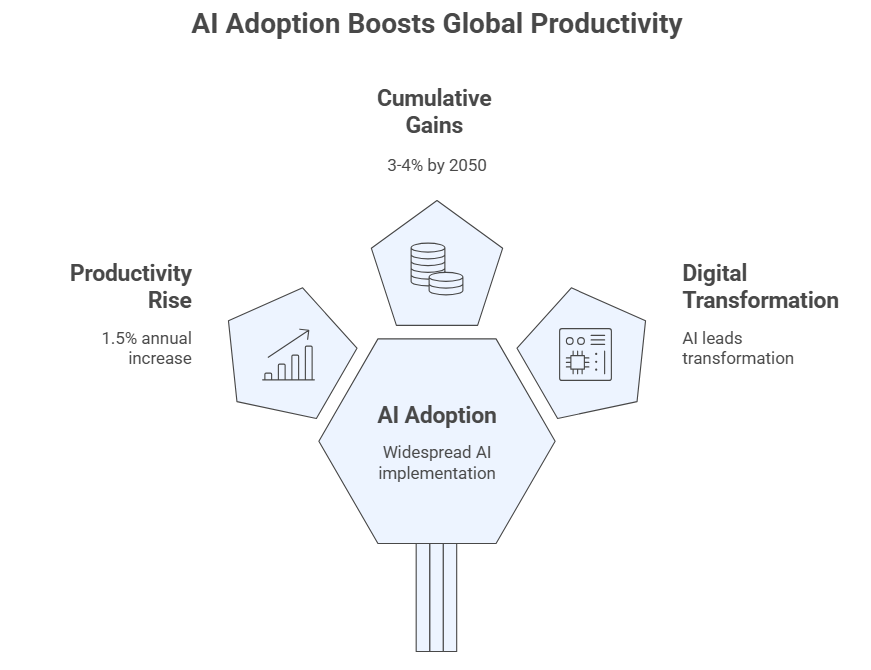Artificial Intelligence to Increase Software Market Size and Productivity
Artificial Intelligence (AI) is no longer a buzzword it is now the backbone of software innovation in the modern era. To any AI software development company, the dramatic adoption of AI into mainstream software ecosystems is both an enormous opportunity and a revolution for productivity.
The world software market, already a multi-trillion-dollar market, is growing more rapidly than ever due to the capacity of AI to automate routine tasks, improve decision-making, tailor user experiences, and speed up development cycles. AI not only grows the size of the software market but also transforms productivity standards across sectors.
This piece discusses how AI powered software market growth, enhances productivity, and what businesses can do to achieve its full potential.
We’ll cover:
- The Expanding Software Market Through AI
- Growing Role of AI in Enhancing Productivity
- Key Drivers and Use Cases of AI in the Software Market
- Challenges and Risks of AI Integration
- Strategies for AI Software Development Companies
- AI’s Broader Economic Impact
Let’s begin by examining the market dynamics that underpin this transformation.
The Expanding Landscape: AI & the Software Market
AI’s Contribution to Software Market Size
The global AI software market is experiencing significant growth. According to Statista, the market size was valued at approximately USD 51.27 billion in 2022 and is projected to reach USD 126 billion by 2025, reflecting a compound annual growth rate (CAGR) of about 24.4%.
This growth is driven by:
- Integration of AI in General Software Tools: AI is increasingly embedded in various software applications, such as analytics, DevOps, and security tools, enhancing their capabilities and performance.
- Emergence of AI-Native Software Categories: New software categories, including autonomous systems, AI copilots, and generative platforms, are being developed, creating fresh market opportunities.
As a result, the software market is evolving beyond traditional applications and enterprise systems to include AI-augmented layers, middleware, and frameworks.

Market Growth Beyond AI-Software Alone
The broader AI market is also expanding rapidly. Statista projects the global AI market size to grow from USD 70.94 billion in 2023 to USD 126 billion in 2025, with a CAGR of approximately 24.4%.
This widespread adoption of AI across various industries, including healthcare, finance, and manufacturing, positions software companies with AI capabilities to capture a larger share of the market.
In summary, AI is significantly influencing the software market size by driving innovation, creating new product categories, and enhancing the capabilities of existing software tools. Companies that leverage AI are well-positioned to capitalize on these growth opportunities.

Growing Role of AI in Enhancing Productivity
AI’s biggest contribution to software development is in productivity gains. From engineers to analysts, AI tools help people work faster, smarter, and with fewer errors.
Productivity Gains in Software Development
- Faster Coding: AI copilots and code generators reduce time spent writing boilerplate or repetitive code. Tasks that once took hours are now done in minutes.
- Smarter Debugging: AI can scan thousands of lines of code, identify vulnerabilities, and even suggest fixes, reducing testing and debugging time.
- Automated Documentation: Natural language AI tools generate and maintain documentation, keeping projects aligned with minimal manual effort.
- Streamlined Collaboration: AI-powered project management tools forecast bottlenecks, automate task assignments, and improve team coordination.
- Accelerated QA: Automated test creation and AI-based bug prediction shorten release cycles without compromising on quality.
These productivity improvements are not small studies show that companies using AI tools can improve output by 20–40%, drastically reducing time-to-market and operational costs.
Also Read: Growing Role of AI
Key Drivers and Use Cases of AI in the Software Market
1. Generative AI in Development
AI assistants write code, rewrite old logic, and suggest performance improvements. This mitigates junior developer bandwidth dependence while freeing up senior engineers to work on system architecture.
2. Automated Testing & Quality Assurance
AI-driven QA provides wider test coverage, automates regression tests, and forecasts system crashes ahead of time. This enhances reliability and minimizes expensive post-launch repairs.
3. AI in DevOps and Infrastructure
Machine learning algorithms forecast infrastructure crashes, optimize server utilization, and auto-scale systems with regard to user demand reducing downtime while saving money.
4. AI-Enhanced Security
Modern software has to protect against cyber attacks. Anomaly detection systems powered by AI constantly scan traffic and user activity for intrusions in real-time.
5. Domain-Specific Applications
- Healthcare: AI-driven diagnostic tools in imaging and genomics.
- Finance: Fraud detection, risk scoring, and robo-advisory platforms.
- Manufacturing: Predictive maintenance, robotics, and supply chain optimization.
Each of these examples shows how AI is powered new revenue streams while also improving operational efficiency.
Challenges and Risks of AI Integration
As much potential as AI has, businesses need to be careful not to overlook challenges: Over-reliance on AI outputs can lead to errors if not validated by humans.
- High data dependency: AI systems need large, clean datasets to perform accurately.
- Integration complexity: embedding AI into legacy software often requires restructuring.
- Talent shortages: AI engineers, data scientists, and ML specialists are in high demand.
- Ethical & legal considerations: bias in AI models, data privacy, and regulatory compliance are growing concerns.
- Infrastructure cost: training large AI models demands significant computing power.
Navigating these risks requires a strategic adoption plan, continuous monitoring, and investment in both technology and talent.

Strategies for AI Software Development Companies
For companies operating in this space, here are key strategies to succeed:
- Adopt an AI-first mindset: Design solutions with AI as a core driver, not an afterthought.
- Focus on high-ROI use cases: Start with processes that directly reduce costs or enhance user experience.
- Modular & scalable architecture: Build systems that allow AI components to evolve independently without disrupting the entire product.
- Ethical AI as a differentiator: Companies that prioritize fairness, explainability, and data privacy gain customer trust and competitive advantage.
- Continuous learning culture: Encourage teams to upskill regularly in AI/ML practices.
- Incremental rollouts: Pilot AI modules in controlled environments before enterprise-wide deployment.
- Leverage cloud AI platforms: Cloud providers offer ready-to-use AI services, accelerating innovation while reducing infrastructure costs.
AI’s Broader Economic Impact
AI’s effect on productivity isn’t confined to software firms it impacts entire economies. By 2035, global productivity could rise by over 1.5% annually due to AI adoption. By 2050, cumulative gains may exceed 3–4%, reshaping industries from healthcare to logistics.

In parallel, AI adoption is increasingly ubiquitous. More than three-quarters of organizations across the globe now have AI deployed in at least one function. Such widespread adoption guarantees that software firms equipped with AI will continue to lead digital transformation.
Final Thoughts
AI growth is changing the size of the software market and driving unparalleled productivity benefits. With the growing demand for smart applications, businesses that leverage AI will not just increase their revenue streams but also establish new standards in terms of speed, quality, and efficiency for the industry.
For business success in this scenario, collaboration with a proven ai software development company is essential.
At App Maisters, we are experts at assisting organizations in using Artificial Intelligence in Software Market solutions to improve productivity, grow efficiently, and innovate with assurance. From developing smart apps to infusing AI-powered analytics, we enable clients to lead the way in an accelerating software landscape.
FAQs
How does AI increase the software market size?
AI is creating new software categories and improving existing ones. App Maisters uses AI to help businesses adopt these innovations, driving market growth and creating new opportunities.
How does AI improve productivity in software development?
AI automates tasks like coding, testing, and debugging, helping teams work faster. At App Maisters, we use AI to make development more efficient and reduce errors, speeding up projects.
What role does an AI software development company play?
An AI software development company, App Maisters builds AI-powered software that helps businesses become more efficient. We integrate AI technologies to create smarter, faster, and scalable solutions.
What are the main uses of AI in the software market?
AI is used in coding assistants, quality checks, system monitoring, and industry-specific tools. App Maisters customizes these AI solutions to meet the needs of each client.
What risks come with using AI in software development?
Risks include errors from over-relying on AI, data needs, and integration challenges. App Maisters helps clients navigate these issues by ensuring responsible use of AI and regular system checks.
Why should companies use AI in their software?
AI helps companies work faster, reduce costs, improve quality, and create new products. App Maisters helps businesses adopt AI to stay ahead in the competitive software market.




















